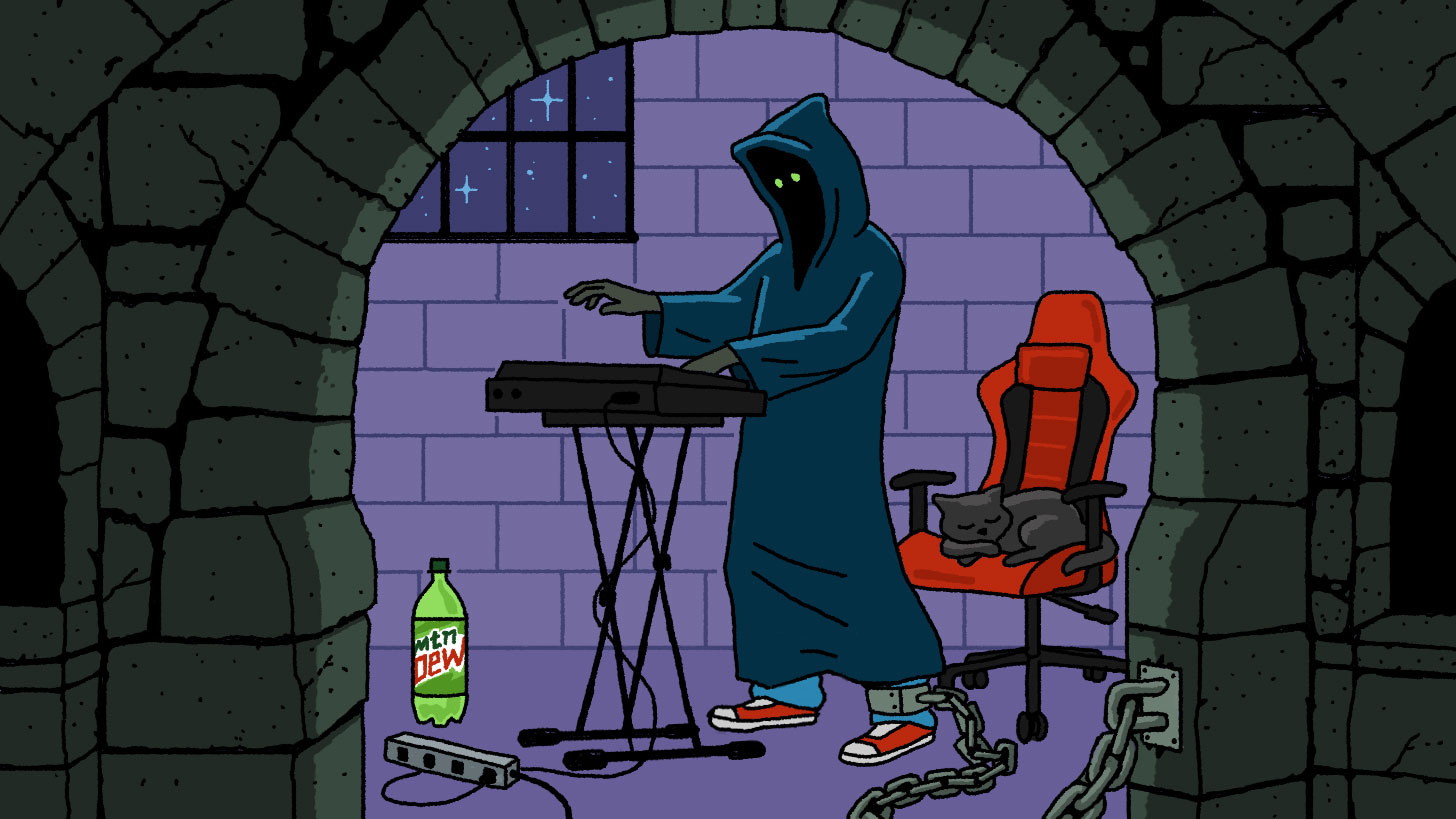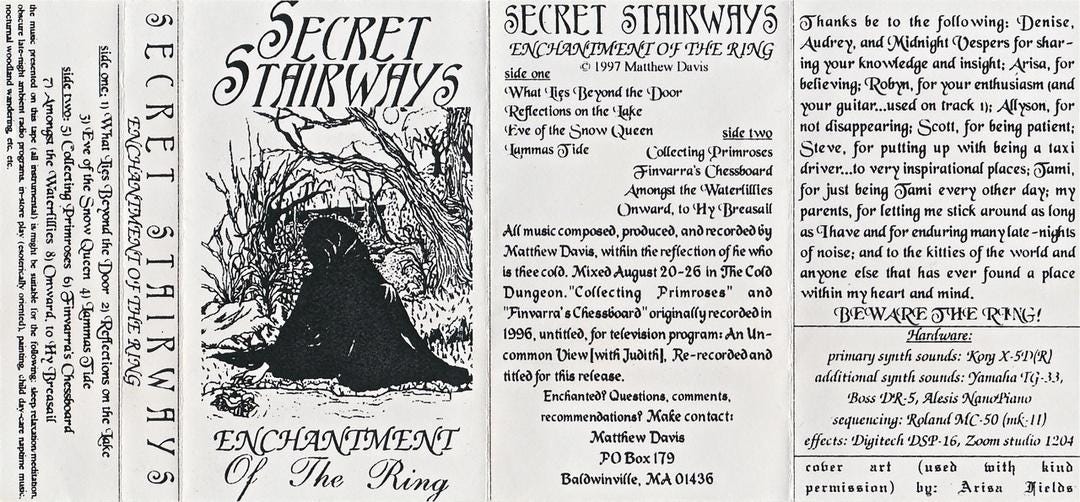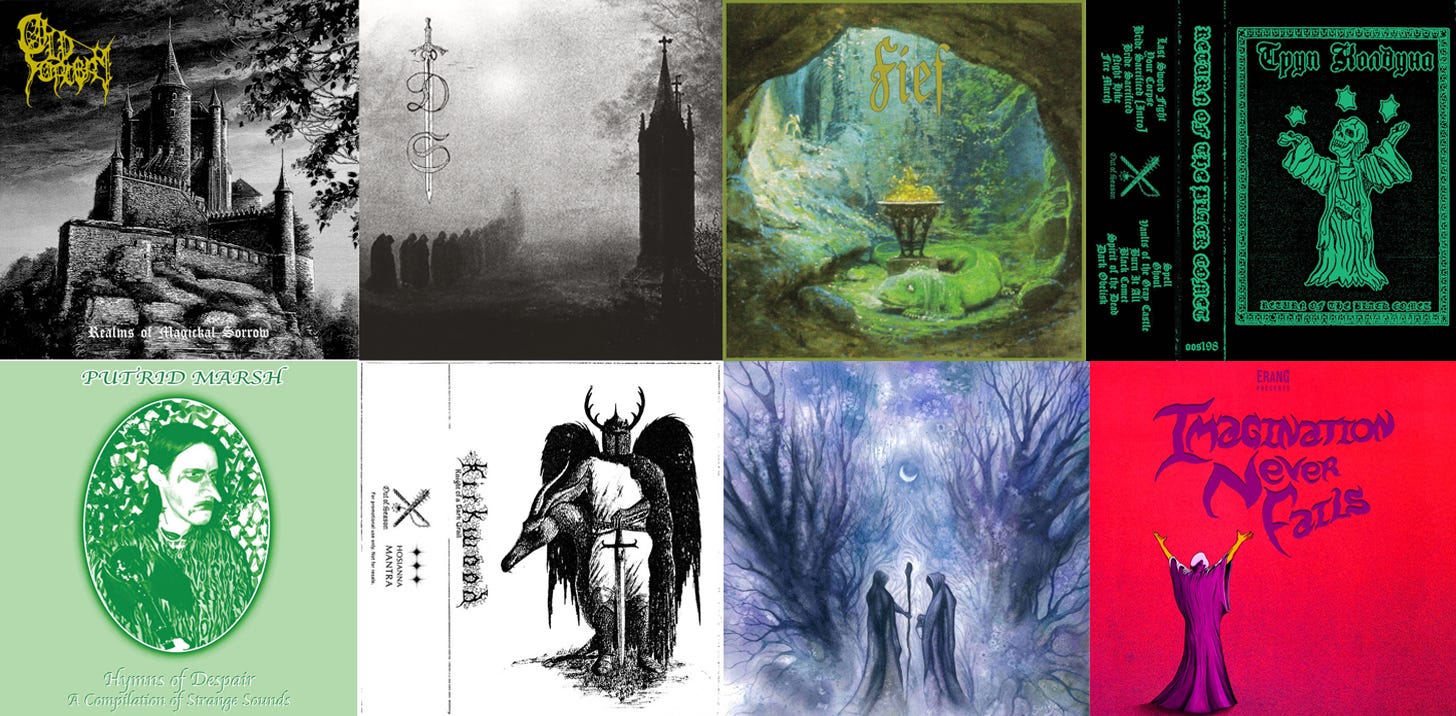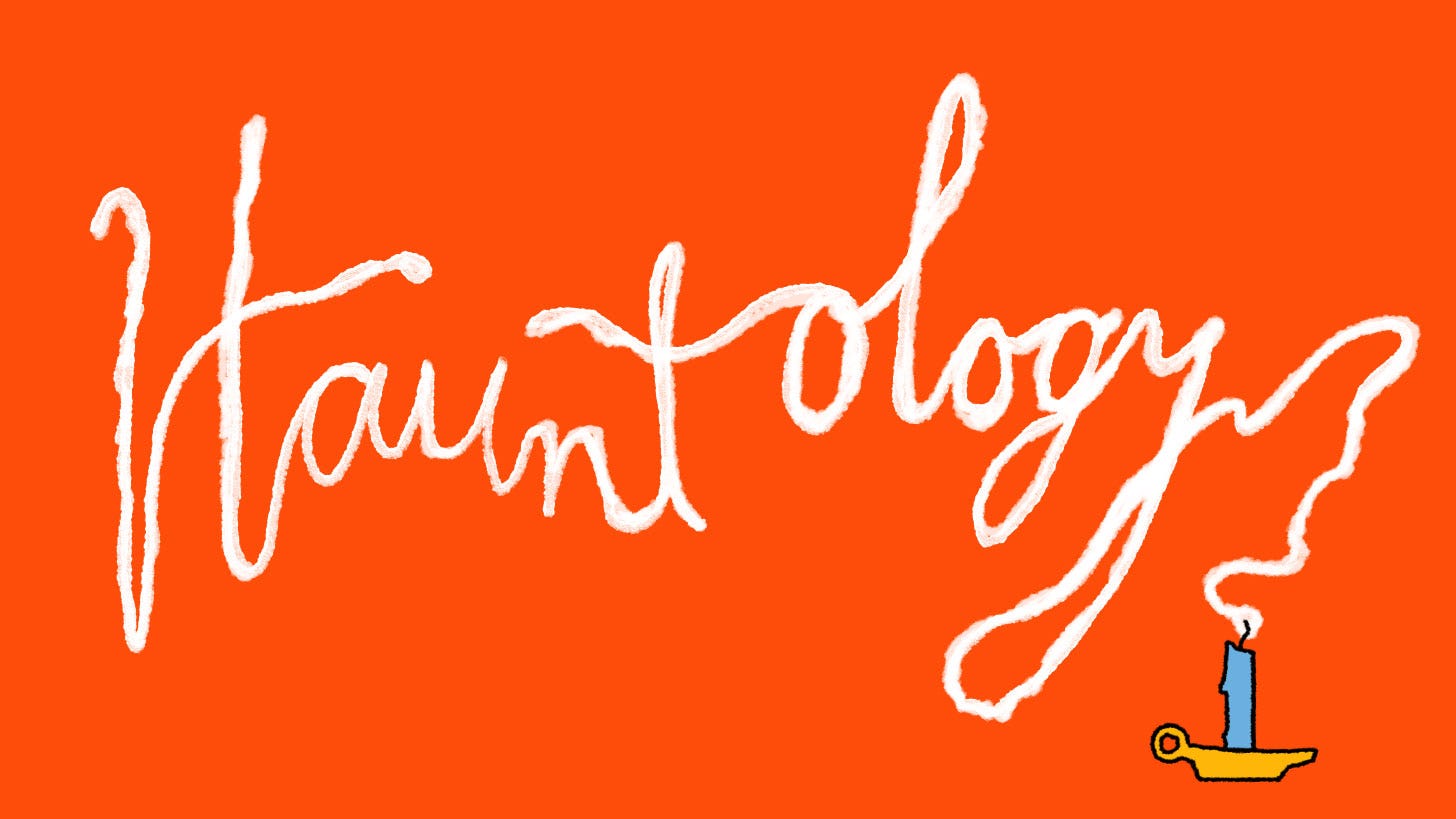On July 10, 2016, a blogger who went by the name thekeeperovsekrets, shared “two ultra-lost and obscure albums” of haunting synth instrumentals by an artist called Secret Stairways.
“Both of these releases have been virtually impossible to obtain until now,” thekeeperovsekrets wrote, but promised they were destined to become “classics.”
The albums, Enchantment of the Ring and Turning Point, had been ripped from a self-released cassette and CD-R made in the 90s. To download the music, you had to follow a few steps familiar to anyone who frequents music blogs: a Google Drive link, a .zip file to your desktop, then multimedia software like VLC Player or iTunes.
The internet is full of “lost and obscure” albums—disco from Pakistan, psych from Cambodia, proto-punk from Kansas. These artifacts are momentarily rediscovered by online music obsessives, then quickly swept back into the collective memory hole. But Secret Stairways held its own unique appeal.
“The music presented on this tape (all instrumental) might be suitable for the following: sleep relaxation, meditation, obscure late-night ambient radio programs, in-store play (esoterically oriented), painting, child day-care naptime music, nocturnal woodland wandering, etc…” read the liner notes of Enchantment of the Ring, Secret Stairways’ first release. The accompanying artwork looked like a black-and-white xeroxed copy of a vintage fantasy paperback.
This description was accurate. Enchantment of the Ring sounded like it originated in J.R.R. Tolkien’s Middle Earth not Baldwinville, Massachusetts. Made primarily on a Korg X5D synthesizer, the music was obviously inspired by Tangerine Dream, a German fantasy synth group that made soundtracks for beloved 1980s films like Legend and Firestarter.
Not long after thekeeperovsekrets posted the Secret Stairways albums, they were uploaded to YouTube, where over time Enchantment of the Ring racked up hundreds of thousands of listens.
“Listening to this is like being gently guided out of reality into a wonderful dream forest, discovered by an amazingly beautiful and friendly faerie spirit, and taken by the hand into a wonderful secret place outside the world where love and friendship last forever,” wrote one YouTube commenter.
Another marveled: “Imagine if you told this guy in ‘97 that his cassette would be heard by a quarter of a million people around the world via the Internet.”
The man behind Secret Stairways was Matthew P. Davis, a composer who committed suicide in 2011. As the cult of Secret Stairways grew, new details emerged about his life. He was 37 when he died. He was a talented multi-instrumentalist who played in several goth and heavy metal projects. He lived with his sister. He was kind and sensitive. He worked at a supermarket.
“This is the sound of desolate adventure. You set out to accomplish something grand, but it never happened and never will. You have realized your quest is in vain. There is no resolution. All you can do is descend deeper into the dungeon. You are too far deep into the pit. The only way forward is down,” wrote a YouTube commenter, hearing Davis’s personal demons buried within the music.
Davis’s tragedy lent Secret Stairways a depth that transcended Ren Faire kitsch and gave solace to fans who struggled with their own depression. In internet terms— Secret Stairways made sadness “epic.”
I didn’t know any of this when I discovered Secret Stairways in 2020 during the COVID-19 lockdowns.
At the time, I was walking my dog, scrolling the Bandcamp app and the artwork for Enchantment of the Ring caught my eye. When the song “What Lies Beyond the Door” came through my headphones, I knew I’d found my pandemic soundtrack.
During quarantine, Los Angeles, where I live, felt otherworldly. My neighborhood was empty, free of traffic and pedestrians. The streetlights hummed but had nothing to illuminate. The air was grey with ash from not-so-distant wildfires. It was dystopian but if I’m being honest, I kind of enjoyed it. Living through a civilizational event is compelling. Everyone was on a shared quest, even if that just meant wearing a mask to the Whole Foods. And somehow Secret Stairways synced with this strange feeling.
As it turned out, Secret Stairways was part of a medieval-obsessed sub-genre of electronic music I was unaware of called Dungeon Synth. The music itself is lo-fi, composed on free software or with cheap synthesizers using factory presets. Albums are preferably traded on cassette tapes or shared on Bandcamp. Dungeon Synth artists have names like Warlock Corpse, Hedge Wizard and Old Sorcery. Their logos are hand drawn, gnarly and often unreadable. While listening to Dungeon Synth, it’s easy to imagine a unicorn with long, beautiful hair galloping in slow motion through a moonlit forest. Over the pandemic I fell in love with the genre. The goblin-chic aesthetics. The witchy vibes. All of it.
Long before Matthew P. Davis created Secret Stairways, artists like Bo Hansson and Jim Kirkwood composed music influenced by Tolkien. In 1970, Hansson released Music Inspired by Lord of the Rings, a now classic prog rock instrumental album. In the early 1990s, British keyboard wizard Jim Kirkwood made The Middle-Earth Trilogy, three Tolkien-themed new age albums. In recent years, Kirkwood’s music has been rediscovered by Dungeon Synth fans and rereleased by Out of Season, a Maine based record label that specializes in the genre.
The Dungeon Synth scene evolved from Norway’s fiercely independent black metal community. Much of black metal is self-recorded and independently-released. Emotion and ambience are valued over professional musicianship or technical ability. Burzum and Mortiis, two important black metal artists, pushed the boundaries of the genre by inserting dark ambient passages into their more aggressive music. Håvard Ellefsen, Mortiis’s frontman, described this material as “dark dungeon music.”
But the biggest musical inspiration for today’s Dungeon Synth artists are video game soundtracks. The music from RPGs like Final Fantasy and The Elder Scrolls have been foundational to a generation of young composers. In immersive RPGs, a player becomes the central protagonist in a highly personalized adventure. As a result, many people get hyper-attached to their favorite video game scores.
One of my favorite Dungeon Synth albums is Flickers from the Fen’s 2023 release Stoned in Gielinor. The cover features a painting of an old-timey wizard surrounded by candles. Instead of staring into a scrying crystal or thumbing through the yellowed pages of the Necronomicon, he is seated in front of an outdated desktop computer playing a video game. The liner notes read:
“You've just ordered Pizza Hut and a 2L Mountain Dew. You've loaded up RuneScape on your PC. No school tomorrow. Your parents don't care if you stay up all night long. A perfect Summer night. You are 28 years old. The year is 2023.”
This “iNteRnEt prOveRb” is a copypasta meme that floats around online gaming communities. The details change depending on the person who posts it: Pizza Hut might become Little Caesars, Runescape might become World of Warcraft, 28 years old might become 18 or 38 etc... It’s a sentiment that sums up the stuck feeling pervasive in our modern lives. Through our phones, computers and gaming consoles, the world appears to be at our fingertips but is impossible to touch. Our screens offer a spectral version of reality that offers infinite pleasure but is inherently unsatisfying.
There is a word for all of this, hauntology.
Hauntology is a concept coined by Jacques Derrida, the French philosopher and later expanded upon by British essayist and music critic Mark Fisher. It refers to the way the present is “haunted” by nostalgic visions of the past and futures that never materialized.
“What haunts the digital cul-de-sacs of the twenty-first century is not so much the past as all the lost futures that the - twentieth century taught us to anticipate,” wrote Fisher.
Fisher examined hauntology in his 2014 book, Ghosts of My Life: Writings on Depression, Hauntology & Lost Futures. Because of these “lost futures,” he observed that contemporary music and art are left to recycle old forms. Today’s rock bands rehash worn out versions of punk, soul, and heavy metal. Electronic musicians use vintage synthesizers, samples and low-fidelity production techniques to make music that sounds simultaneously ancient and futuristic. This dissonance, using modern tools to evoke pre-modern aesthetics, creates the dislocated feeling central to hauntology.
Over email, I chatted with Lord Tetrarch or LT, a prolific Dungeon Synth artist who composes music under several names: Diplodocus, Grandma’s Cottage and Bespin Moons. LT also runs Dungeons Deep Records, an Ohio-based label that reissued the two Secret Stairways albums.

“My main source of inspiration - nostalgia. Nostalgia for toys and movies I enjoyed in youth. Places in history I have read about, but never experienced. Ideas and concepts like medieval fantasy or science fiction. I even have nostalgia for stories and ideas that only exist in my own mind,” stated LT.
Dungeon Synth yearns for a mythological past that's constructed from fragments of imagination rather than historical reality. The music is an artifact of this longing and melancholy.
During the pandemic, I wasn’t the only one tuning into Dungeon Synth’s anachronistic frequency. The tiny niche expanded, as hundreds of new Dungeon Synth artists popped up on Bandcamp and Youtube. Playlists appeared on Spotify with titles like Dark Fantasy and Wizard Music. And as the quarantine lifted, “Dungeon Siege” music festivals were organized in Massachusetts, Texas and London.
“Around 2020 is when things really started booming,” said LT. “Dungeon Synth is one of the most internet friendly genres. Strongly based around community and digital sharing, what better thing to do while locked away inside than start your own solo keyboard project? The fun of collecting tapes, records and merch never slowed down, and people were spending their money during this time by having items shipped to their homes.”
LT found his small DIY label growing, mailing cassettes and LPs all over the world.
“I believe the main reason fans are drawn to it is because Dungeon Synth is very inward,” he said. “It is not usually something you would listen to in a party type setting. It is perfect for contemplating. Even producing Dungeon Synth is an inward experience. Typically done in solitude, and many times released anonymously. The anonymity also eases the listener, as no huge ego is attached to the music, so you can focus on your own mental world of creation.”
Mark Fisher’s Ghosts of My Life is a companion to his 2009 masterwork Capitalist Realism. In that book, Fisher popularized the notion that it’s easier to imagine the end of the world than the end of capitalism. We all inherently understand that capitalism will lead to environmental catastrophe, for-profit wars and endless exploitation. It’s a race to the bottom that keeps us looking backward or retreating into fantasy because of our inability to imagine genuinely new modes of existence.
“I know from experience that Dungeon Synth can be a great way to escape anxiety and depression brought on by the toils of a trivial world,” LT explained. “I think a lot of people see Dungeon Synth as funny or tongue-in-cheek. I guess I see it a little differently, I believe most of it is very sincere.”
Like Matthew P. Davis of Secret Stairways, Mark Fisher suffered from severe depression. It was a struggle he documented throughout his writing. To him, depression wasn’t merely a brain chemistry imbalance, it was an understandable response to the dehumanization of capitalism - the constant pressure to be productive, the erosion of collective solidarity, the internalized feelings of personal failure and the collapse of meaningful social structures. He took his own life in 2017 and has since become one of the internet age’s most influential thinkers.
“Dungeon Synth brought me out of a huge funk,” said LT. “It’s lovely to become part of this beautiful and welcoming community of fans and musicians. I cannot speak for everyone, but in a world where the news is all doom, gloom and politics, Dungeon Synth is the sort of thing that almost purposefully ignores all of that in preference of a respite via imagination. It seems like all the corporations of this world have teamed up together to put an end to creativity, and will no longer take a chance on the weird ideas that made the 1900’s so memorable. I think Dungeon Synth, independent musicians and artists in general, are just trying to take that back so we can enjoy it again.”
Tolkien fought for England in World War I and watched “all but one” of his close friends die in the trenches. In World War II, he put his language skills to work as a codebreaker. As that war drew to a close, Tolkien wrote in a letter:
“Well the first War of the Machines seems to be drawing to its final inconclusive chapter - leaving, alas, everyone the poorer, many bereaved or maimed and millions dead, and only one thing triumphant: the Machines. As the servants of the Machines are becoming a privileged class, the Machines are going to be enormously more powerful.”
The ravages of war and industrialization served as the backdrop for his Lord of the Rings trilogy. In the books, the evil Orcs are “industrial” beings: mass-produced, standardized and lacking any individual identity. Mordor, the hell-scape ruled by Lord Sauron, was based on the mines and iron works that blighted Tolkien’s childhood home of the West Midlands. In contrast, the saga’s more heroic characters, Elves, Men, Dwarves, Ents and Hobbits, maintain their humanity through compassion, personal choice, and connection to nature. The books expressed Tolkien's desire for a more humane, environmentally responsible, slow-paced and collaborative path forward. A return to the shire. It’s no wonder Lord of the Rings still resonates with people who feel alienated by the warp speed of the attention economy.
Not long ago, I found myself running errands before work. I drove to CVS to pick up a prescription, then the post office. In the car I was listening to Flies the Coop by Hole Dweller, a Dungeon Synth artist from Athens, Georgia. According to the liner notes, the album is about “a humble hobbit” named Jamwine Hamfiddle who embarks on a journey carrying only a longpipe and walking stick. In my head, I was mentally assembling a to-do list for the day: emails, more emails, zoom meetings, online bills to pay. I needed to grab a quick breakfast, so I pulled into a Starbucks drive thru and ordered a medium coffee with milk and a spinach and feta, egg-white wrap. It came to a total of $8.50. I coasted up to the pick-up window and the barista heard Hole Dweller coming from my car stereo.
“Oh, it sounds like you are about to go on a fun adventure!” she said.
Arthur Jones is a documentary filmmaker, writer & illustrator. He’s best known for his 2020 film Feels Good Man.


















Thank you for sharing this! It reminds me of tape trading - the roots of modern music subcultures.
Sometimes I read pieces about micro genres and just from the text alone I’m like “I’m good, don’t need to hear that” but this piece made me race to hear this music. A credit to both the creative spark in the genre and the writer’s skill.